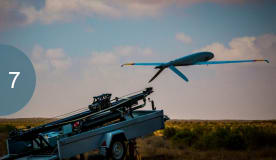Analysis/First Drone War Pulls Israel’s Conflict With Iran Out of the Shadows
عاموس هاريل/هآرتس: حرب الدرون تُظهر للعلن الصراع الإسرائيلي-الإيراني
Amos Harel/Haaretz/August 31/2019
A battle over optics also being waged: Nasrallah paints Beirut targets as marginal, while Israel makes effort to expose the Hezbollah precision-missile project ■ What happened to Israel’s promise on China?
“You can go to sleep. The reaction isn’t going to happen today,” Hezbollah Secretary General Hassan Nasrallah was quoted in the Lebanese press as saying the other day in remarks before what was referred to as a “closed forum” of clerics. “We are never hasty.
For the Quneitra events,” he also said on Wednesday, referring to the assassinations of Hezbollah operative Jihad Mughniyah and an Iranian general in January of 2015, he added, “it took us 10 days to respond.”
It is unlikely that the Israel Defense Forces took these words literally. The Northern Command’s high alert for a possible attack is still in effect and the military patrols along the borders with Lebanon and Syria have been reduced, with the aim of limiting the number of possible targets for Hezbollah.
Chief of Staff Aviv Kochavi is familiar with the situation from up close. He was GOC Northern Command during the Winter Sun alert, at the time of the “Quneitra events” to which Nasrallah referred. Following those events, Hezbollah responded to the assassinations of Mughniyah and the Iranian general by launching anti-tank missiles, which killed a company commander and a soldier from the Givati Brigade on the slopes of Har Dov.
We can hope that the appropriate conclusions have been drawn and that this time the command, which was also burned in the incident as the Nurit army post in Western Galilee in 2004, has seen to ensuring that forces not directly subordinate to the divisions along the border are taking the necessary precautions.
The assumption still stands: There will be a response. Nasrallah, as he sees it, must send a return signal. He established this from the moment he declared that Israel had attacked in Lebanon (and in Beirut, no less) – for the first time, demonstratively from the air – and violated a truce in effect for 13 years, since the end of the Second Lebanon War.
The Military Intelligence Directorate does not believe that the region is heading toward a war. Their assessment, also based on statements by Nasrallah and his deputy, Naim Qassem, is that Hezbollah is looking for a measured response – measure for measure – that will go down in the history books but will not lead to an escalation of the tensions.
In the background, there is also an open account with another key player, Maj. Gen. Qasem Soleimani, commander of the Quds Force of the Iranian Revolutionary Guard. On the night between Saturday and Sunday there were two attacks.
The action in Beirut was preceded by an air force strike on a Revolutionary Guards cell, south of Damascus. The two activists who were killed in the strike, former Hezbollah men, were on a mission ordered by Soleimani on their way to launching explosive drones at the border with Israel in the Golan Heights.
Alongside the shooting, there is also a battle over the narrative. Nasrallah, in his speech, emphasized the hit on his people in Syria and tried to depict the attack in Beirut as a hit on a marginal asset, out of unclear considerations on Israel’s part. Israel, since Thursday, has been taking the opposite tack. For the first time the IDF revealed extensive details about Hezbollah’s “precision project” being aided by Iran.
It is part of an effort to upgrade the precision of some of the rockets in the organization’s hands, so that they may be able to strike within approximately 10 meters of a given target. The Iranians and their partners in Lebanon have tried to achieve this by means of attempts to smuggle weapons, most of which have been thwarted, and recently by setting up production lines on Lebanese territory.
It is an IDF assessment that Hezbollah possesses several dozen rockets with a high degree of precision capability. Many others were hit during the smuggling attempts, production sites have been exposed and evacuated and on Saturday evening an essential element at a new production site was also hit, shortly before it was to be transferred to a secure site underground.
This is the message Israel is trying to send: Nasrallah has built a secret combat system with the Iranians, right under the noses of the inhabitants of Lebanon and its government. In his insistence on carrying out this project, he is endangering all Lebanese.
The sequence of incidents in the north, including at least two attacks attributed to Israel against Shi’ite militias in Iraq, has brought the shadow war that has been going on for years between Jerusalem and Tehran out of the twilight and into relatively explicit daylight.
However, what happens next will also be influenced by a larger strategic move currently afoot, the attempts to renew negotiations between the United States and Iran concerning the nuclear agreement.
Both Nasrallah and Solemeini are constrained by broader strategic considerations. It is hard to believe that Iran wants a war with Israel when on the horizon there appears to be a real chance of renewing direct talks with Washington. For its part, Russia too has a clear interest in reining in the escalation because it might endanger the stability of Bashar Assad’s regime in Syria.
As for Hezbollah, it appears that the balance of deterrence with Israel since 2006 remains in effect. Both sides are aware of the potential for mutual destruction that would befall them in a third Lebanon war, in which it is doubtful whether there would be any strategic benefit from their perspective. Hezbollah is wary of Israel’s intelligence and airborne superiority, which is demonstrated so frequently in the north. Israel is aware of the unprecedented danger to the Israeli home front posed by Hezbollah rockets.
Benjamin Netanyahu, in his capacity as minister of defense, is responsible for thwarting dangers developing along the border, ranging from drone attacks launched from Syria to striking the essential element of a Hezbollah rocket production line in Syria.
As prime minister, he is up to his ears trying to figure out the intentions of his pal, American President Donald Trump. The Iranians are perceiving an opportunity to hold a summit between Trump and President Hassan Rouhani as a realistic option, and this in the short term. This scenario is arousing deep pessimism among those close to the prime minister.
What has been described this week as the first drone war, following the actions in Beirut and near Damascus, has gone beyond the confines of a shadow war, and has also been referred to as the campaign between the wars.
Maj. Gen. (res.) Amos Yadlin and Brig. Gen. (res.) Assaf Orion of the Institute for National Security Studies wrote this week that “the guiding principle of the ‘campaign between the wars’ is to avoid an escalation and to manage operations below the threshold of a war, in order to reduce the enemy’s sense of urgency to embark an escalatory response: spacing of the attack operations in order to enable the enemy’s system to cool off and taking care to maintain a low public profile, which will leave the enemy, who has come under attack, space for denial and reduce the political and public constraints that would compel a response.”
According to them, “The attack in Syria was given extensive coverage in Israel, ostensibly in order to justify an initiated lethal attack on the target and thwart a terror attack. This justification explains the laconic and dry coverage but not the prime minister’s televised declaration in the Golan Heights, with the chief of staff at his side and his back to Syria. And indeed, Nasrallah related to this as boasting. Taunting tweets from the IDF Spokesman directed against Soleimani exceed what is required.”
Yadlin and Orion note that in his speech Nasrallah said his organization would not reconcile itself anymore to the presence of Israeli unmanned aircraft in the skies of Lebanon and would act to bring them down. They see increasing tension between Israel and the United States.






















